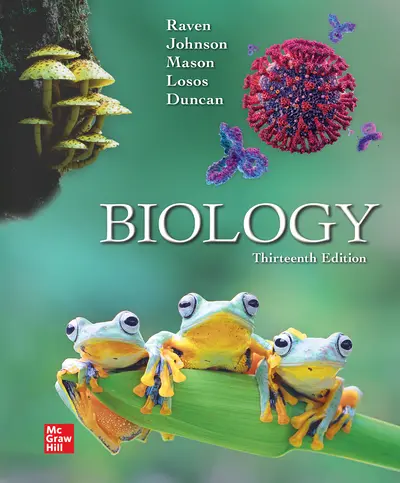My Account Details

ISBN10: 1264097859 | ISBN13: 9781264097852

* The estimated amount of time this product will be on the market is based on a number of factors, including faculty input to instructional design and the prior revision cycle and updates to academic research-which typically results in a revision cycle ranging from every two to four years for this product. Pricing subject to change at any time.
Instructor Information
Quick Actions (Only for Validated Instructor Accounts):
The Raven & Johnson's Biology author team is committed to continually improving the text, keeping the student and learning foremost. The integrated pedagogical features expand the students' learning process and enhance their learning experience. This latest edition of the text maintains the clear, accessible, and engaging writing style of past editions with the solid framework of pedagogy that highlights an emphasis on evolution and scientific inquiry that have made this a leading textbook for students majoring in biology. This emphasis on the organizing power of evolution is combined with an integration of the importance of cellular, molecular biology and genomics to offer our readers a text that is student friendly and current.
Additionally, with McGraw Hill Connect, powerful digital tools augment instruction by helping students think more critically, develop quantitative and graphing skills and apply their knowledge in a laboratory setting. Connect Virtual Labs can be implemented in a hybrid or fully online setting to help students prepare for the wet lab and strengthening their lab experience.
1 The Science of Biology
2 The Nature of Molecules and the Properties of Water
3 The Chemical Building Blocks of Life
Part II Biology of the Cell
4 Cell Structure
5 Membranes
6 Energy and Metabolism
7 How Cells Harvest Energy
8 Photosynthesis
9 Cell Communication
10 How Cells Divide
Part III Genetic and Molecular Biology
11 Sexual Reproduction and Meiosis
12 Patterns of Inheritance
13The Chromosomal Basis of Inheritance, and Human Genetics
14 DNA: The Genetic Material
15 Genes and How They Work
16 Control of Gene Expression
17 Biotechnology
18 Genomics
19 Cellular Mechanisms of Development
Part IV Evolution
20 Genes Within Populations
21 The Evidence for Evolution
22 The Origin of Species
23 Systematics, Phylogenetics, and Comparative Biology
24 Genome Evolution
Part V Diversity of Life on Earth
25 Origin and Diversity of Life
26 Viruses
27 Prokaryotes
28 Protists
29 Seedless Plants
30 Seed Plants
31 Fungi
32 Animal Diversity & the Evolution of Body Plans
33 Protostomes
34 Deuterostomes
Part VI Plant Form and Function
35 Plant Form
36 Transport in Plants
37 Plant Nutrition and Soils
38 Plant Defense Responses
39 Plant Sensory Systems
40 Plant Reproduction
Part VII Animal Form and Function
41 The Animal Body and Principles of Regulation
42 The Nervous System
43 Sensory Systems
44 The Endocrine System
45 The Musculoskeletal System
46 The Digestive System
47 The Respiratory System
48 The Circulatory System
49 Osmotic Regulation and the Urinary System
50 The Immune System
51 The Reproductive Systems
52 Animal Development
Part VIII Ecology and Behavior
53 Behavioral Biology
54 Ecology of Individuals and Populations
55 Community Ecology
56 Dynamics of Ecosystems
57 The Biosphere and Human Impacts
58 Conservation Biology
Accessibility
Creating accessible products is a priority for McGraw Hill. We make accessibility and adhering to WCAG AA guidelines a part of our day-to-day development efforts and product roadmaps.
For more information, visit our accessibility page, or contact us at accessibility@mheducation.com
Affordability
Reduce course material costs for your students while still providing full access to everything they need to be successful. It isn't too good to be true - it's Inclusive Access.
Need support? We're here to help - Get real-world support and resources every step of the way.